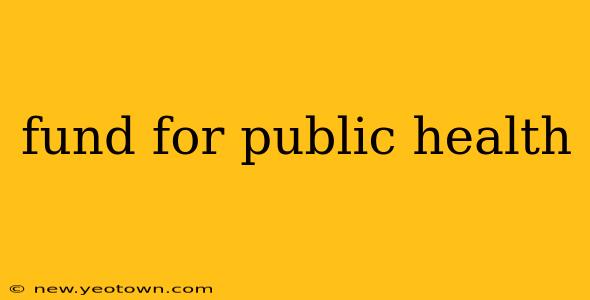The health of a nation is its greatest wealth. But maintaining that health requires a significant investment – a robust and reliable system of public health funding. This isn't just about treating illnesses; it's about preventing them, promoting wellness, and ensuring everyone has access to the care they need, regardless of their background or socioeconomic status. The story of public health funding is complex, involving a delicate balance of government allocation, private investment, and community engagement. Let's explore the intricate web that supports this vital system.
How is Public Health Funded?
Public health funding is a multifaceted puzzle with many contributing pieces. Government funding at local, state, and federal levels forms the backbone. Think of the Centers for Disease Control and Prevention (CDC) in the US, or similar national public health agencies in other countries; these are largely publicly funded. This money supports crucial initiatives like disease surveillance, health education campaigns, and research into new treatments and preventative measures.
Beyond government sources, private foundations play a significant role. Organizations like the Bill & Melinda Gates Foundation dedicate substantial resources to global health initiatives, often focusing on tackling infectious diseases and improving healthcare access in underserved communities. Corporate sponsorships and philanthropy also contribute, though often with more targeted aims.
Finally, community-based fundraising and individual donations, while perhaps smaller in scale, play a vital role in bolstering local health programs and addressing specific community needs. It’s a collective effort, where every dollar counts.
What are the Biggest Challenges in Public Health Funding?
Securing adequate funding for public health is an ongoing struggle, fraught with challenges. One of the most significant is the tendency for public health spending to be viewed as a cost rather than an investment. When budgets are tight, public health programs are often among the first to face cuts, even though proactive measures are far more cost-effective in the long run than reacting to crises.
What are the major sources of public health funding in the US?
In the US, the federal government, through agencies like the CDC and the National Institutes of Health (NIH), provides a substantial portion of public health funding. State and local governments also contribute, allocating resources to their own health departments and programs. Private foundations, philanthropic organizations, and even some corporate initiatives add to this mix. However, the proportions vary widely depending on the specific program and location.
How does funding for public health compare to funding for other sectors?
Public health funding is often dwarfed in comparison to spending on other sectors like defense or healthcare. This disparity highlights the ongoing need for greater awareness and advocacy to ensure public health receives the investment it deserves. The long-term benefits of preventive measures and disease control far outweigh the initial costs, but this often needs to be effectively communicated to policymakers.
What are some examples of successful public health initiatives funded by government grants?
The eradication of polio is a shining example of a successful global health initiative largely funded through international cooperation and government grants. Similarly, significant progress has been made in reducing the incidence of HIV/AIDS through government-supported programs focusing on prevention and treatment. These successes demonstrate the power of coordinated and well-funded public health interventions.
How can individuals contribute to improving public health funding?
Even small actions can make a difference. Supporting health-related charities, contacting your elected officials to advocate for increased public health funding, and volunteering your time to support local health initiatives are all meaningful ways to contribute. Raising awareness within your community about the importance of public health is also crucial.
The fight for robust public health funding is an ongoing battle. It requires sustained effort from governments, private organizations, and individual citizens. By understanding the challenges and opportunities, we can work together to build a healthier and more equitable future for all.

